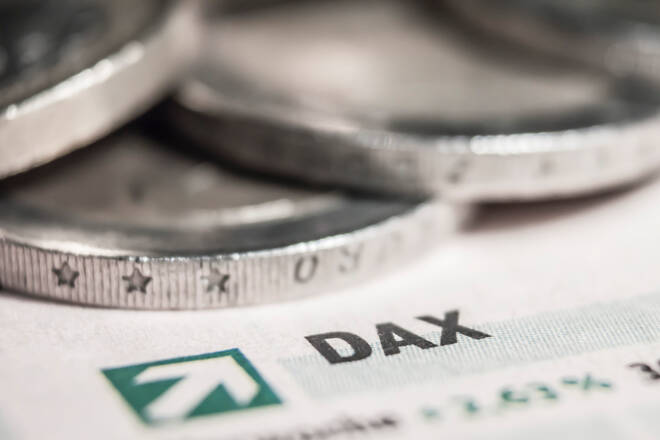Advertisement
Advertisement
European Equities: FED and BoE Monetary Policy and U.S Jobless Claims in Focus
By:
The FED's projections, BoE sentiment towards the economic outlook, and U.S jobless claims will provide direction alongside geopolitics.
Economic Calendar:
Thursday, 17th September
Eurozone Core CPI (YoY) (Aug) Final
Eurozone CPI (YoY) (Aug) Final
Eurozone CPI (MoM) (Aug)
Friday, 18th September
German PPI (MoM) (Aug)
The Majors
It was another relatively bullish day for the European majors on Wednesday.
The CAC40 and the EuroStoxx600 rose by 0.13% and by 0.58% respectively to mark a 4th consecutive daily gain.
For the DAX30, a 0.29% rise delivered a 2nd consecutive day in the green, reversing 3 consecutive days in the red.
Economic data was mixed on the day. Trade data from the Eurozone and retail sales figures from the U.S both disappointed on Wednesday.
Upside on the day came as the markets looked ahead to the FOMC policy decision, projections, and press conference.
On the geopolitical front, there was little to shift the market’s mood on Brexit, while EU Commission President Ursula von der Leyen delivered her union address on Wednesday.
The EU Commission President talked of the rising chances of a no-deal Brexit, which was of little surprise. Of surprise, however, was talk of an ambition to build a new transatlantic agenda with the U.S, regardless of the election outcome.
All in all, the comments had a muted impact, with hopes of dovish interest rate projections propping up the majors.
The Stats
It was a quieter day on the Eurozone economic calendar. Key stats included July trade data for the Eurozone
The Eurozone’s trade surplus widened from €20.2bn to €27.9bn in July. Economists had forecast a narrowing to €12.6bn.
According to Eurostat,
- Exports of goods to the rest of the world slid by 10.4% to €185.2bn compared with July 2019.
- Imports of goods from the rest of the world tumbled by 14.3% to €157.3bn.
- Intra-euro area trade fell by 8.6% to €153.7bn when compared with July 2019.
- Year-to-date, the export of goods to the rest of the world fell by 12.4% to €1,199.6bn compared with January to July 2019.
- Imports fell by 13.1% to €1,086.6bn delivering a Eurozone trade surplus of €113.0bn.
- Intra-euro area trade fell by 13.0% to €1,021.8bn, when compared with January to July 2019.
Annual comparison by Member State:
- In July 2020, compared with July 2019, the export of goods decreased for all member states except Malta (+16.1%), Slovenia (+10.6%), Estonia (+9.4%), and Slovakia (+8.8%).
- Greece (-23.8%), Finland, (-19.6%), and France (-19.5%) resgisted the largest decreases in exports.
From the U.S
Key stats included August retail sales figures and July business inventory numbers. The stats preceded the FOMC monetary policy and economic and interest rate projections and the FOMC press conference.
In July, business inventories rose by 0.1%, following a 1.1% fall in June. Economists had forecast a 0.1% increase.
In August, retail sales figures fell short of forecasts. Core retail sales rose by 0.7%, following a 1.3% increase in July. Economists had forecast a 0.9% rise. Retail sales increased by 0.6%, following a 0.9% rise in July. Economists had forecast a 1% increase in sales.
The Market Movers
For the DAX: It was a mixed day for the auto sector on Wednesday. Continental and BMW rose by 0.51% and by 0.66% respectively, with Daimler up by 0.17%. Volkswagen saw red, however, falling by 0.05%.
It was also a bullish day for the banks. Deutsche Bank and Commerzbank rose by 2.16% and by 1.88% respectively.
From the CAC, it was another bearish day for the banks. Credit Agricole fell by 1.05% to lead the way down. BNP Paribas and Soc Gen saw more modest losses of 0.35% and 0.20% respectively.
It was also a mixed day for the French auto sector. Peugeot and Renault ended the day down by 0.94% and by 1.75% respectively.
Air France-KLM fell by a further 0.87%, while Airbus SE rose by 1.89%.
On the VIX Index
A run of 3 consecutive days in the red came to an end for the VIX on Wednesday. Reversing a 1.01% fall from Tuesday, the VIX rose by 1.76% to end the day at 26.04.
The upside on the day came as the U.S equity markets reversed gains in response to FED Chair Powell’s press conference. A more dovish than expected stance weighed on the majors late in the session.
The NASDAQ and S&P500 fell by 1.25% and by 0.46% respectively, while the Dow rose by 0.13%.
The Day Ahead
It’s another relatively quiet day ahead on the Eurozone economic calendar. Key stats include finalized August inflation figures for the Eurozone.
Barring material deviation from prelim figures, however, the stats will likely have a muted impact on the majors.
Through the early part of the day, the markets will likely respond to the FOMC economic and interest rate projections and Powell press conference.
Later in the day, the markets will shift attention to the BoE monetary policy decision and economic data from the U.S.
Key stats include the weekly jobless claims and Philly FED Manufacturing Index numbers for September.
While both sets of numbers will influence, any disappointing jobless claims would likely overshadow a pickup in manufacturing sector activity.
Away from the economic calendar, Brexit will continue to be an area of focus along with U.S – China tensions.
The Futures
In the futures markets, at the time of writing, the DAX was down by 1.04 points, with the Dow down by 224 points.
For a look at all of today’s economic events, check out our economic calendar.
About the Author
Bob Masonauthor
With over 28 years of experience in the financial industry, Bob has worked with various global rating agencies and multinational banks. Currently he is covering currencies, commodities, alternative asset classes and global equities, focusing mostly on European and Asian markets.
Advertisement
